Now that we’re well into pea planting season and bean planting isn’t far behind, we’ve been considering the practice of inoculating pea and bean seeds with nodule-forming, nitrogen-fixing Rhizobium bacteria, commonly known as legume inoculant.
We’ve inoculated our peas and beans every year for so long that we take for granted the nitrogen that it will return to the garden and the growth benefits to our plants. Those years we forgot to order or otherwise just didn’t have inoculant enough to go around have shown us the difference. Nitrogen may be invisible but its presence can be seen in better growth and soil health.
In a sense, these beneficial bacteria are akin to those in the yogurt we eat on our granola. A sort of soil probiotic, they thrive in our gut, aiding digestion and nourishment. The symbiotic relationship the Rhizobium bacteria has with your legume crops brings more nourishment to your pea and bean plants, witnessed by thick, rapid growth.

#1 YIELD BOOSTER
Nature's Aid
Contains live bacteria that are essential in the nitrogen fixating process of legumes.
$12.95Learn moreGranular for easy application! Nature’s Aid Soil Inoculant improves the growth and production of peas (including sweet peas), peanuts and beans. Contains billions of live bacteria that are essential in the nitrogen fixating process of many plants.
The Rhizobium bacteria exists naturally in the soil, especially if the ground has been previously planted with grown legume crops. Studies have shown that often (though not exclusively), the Rhizobium that comes from prepared inoculants is better at fixing nitrogen than the bacteria already in the soil. Also increasing the amount of bacteria results in more nitrogen fixing. That’s why you can never apply too much legume inoculant. The more you use, the better it works.
Of course, as when dealing with any living thing, desired behaviors can’t be guaranteed. Acidic soil can cut down on the inoculant’s effectiveness. Peas and beans like slightly acidic soil, so you’ll want them grown in in soil with a pH around 6.5, acidic enough to keep your plants happy but not so acidic that you’ll affect the growth of nitrogen fixing nodules on your pea and bean roots.
There’s no right way to apply the inoculant to the seeds. Our favorite is to spread inoculant on an old dinner plate and, after soaking the seeds, rolling them in the inoculant. But we’ve also sprinkled inoculate right from the can after laying the seed in its furrow and before covering with soil.
There are several types of Rhizobium bacteria and most are plant specific when setting up symbiosis. The bacteria that works together with beans and peas is Rhizobium leguminosera. If you intend to buy inoculant in bulk for acreage size planting, make sure you don’t get the Rhizobium inoculant for alfalfa or some other nitrogen-fixing plant. Home gardeners buying container-sized amounts shouldn’t have a problem with this.
The other thing you can do to encourage beneficial bacteria is to make sure there’s a lot of organic material in your soil. This means compost. Not only will it help deliver Rhizobium bacteria to your plants it will carry other types of beneficial bacterial and living matter, like mycorrhizae fungi, that enable plants to improve their uptake of nutrients and water.

All these mostly invisible living things aide organic gardeners in keeping down pests and disease while encouraging vigorous growth. Microbial inoculants of all sorts — mycorrhizae, nitrogen-fixing Rhizobia, and weed, pest, and disease-suppressive biological agents –are being used by home and commercial organic growers looking to cut the chemicals in their garden and still enjoy superlative growth.
In a sense, that’s what organic gardening is all about: keeping the soil alive.
Here’s an in-depth look at the use of various soil inoculants from The Ohio State University Extension Service (PDF) that also deals with the relationship between soil amendments and beneficial bacteria and fungi.











